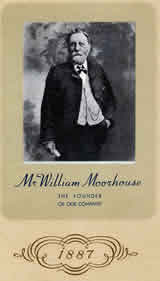 |
William Moorhouse was the fifth son of Thomas
Moorhouse (1809-1845) and Martha and was born on 8th April 1843 when
the family was renting Hesliker farm from The Tempest Estate. [See
Biographies/William
Moorhouse 1843 for details].
After the death of his father Thomas in 1845 the family moved to The
Bull Inn at Broughton, which they rented from The Tempest Estate. On
the 1851 census William was living at The Bull with his Mother and is
described as a scholar. [See also Businesses/Bull
Inn].
By the 1861 census William has moved to Skipton and
is living with William Stockdale and his family. Mr Stockdale had
taken over his father-in-law's
grocery
shop on Sheep Street and was employing William and another young
man as apprentices. |
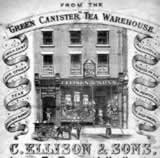 |
William moved to Leeds sometime during the 1860's and went to work for
a grocer called Ellison (probably a relative of his Mother Martha)
who had a grocery and provision business on the Lowerhead Row in Leeds.
William is recorded as living on the Lowerhead Row on the 1871
census working as a grocer.
It was while working, as an apprentice for Mr Ellison that William
would visit farms on the outskirts of Leeds to solicit weekly orders
for groceries. He was visiting
a farm in Swillington and was invited to take tea with the family and was introduced
to a delicacy that was called Lemon Cheese, that he had never heard of or tasted
before. The farmer's wife explained that it was made from new laid
eggs, fresh butter, sugar and lemons. William was so impressed with the
Lemon cheese that the farmer's wife provided him with the recipe. This
incident happened sometime between 1870 and 1875.
|
| |
On 24th June 1873 William married
Angiolina Porri at St Stephen's Church
in Skipton.
They has seven sons over the next 15 years; James Ellison
(born 21st January 1874 and died 24th October 1875), Charles Innocent
(born 8th September 1875), Baldisaro (born 22nd February 1877), Joseph
(born 11th May 1881), Thomas Leo, (born 11th June 1884), William
Edward (born 21 July 1887), and Francis born 19th August 1889). [See
their individual Biographies for more details].
The couple
moved house to 4 Newton Terrace and William continued to work for Ellison
Grocers on the Lowerhead Row while learning how to produce Lemon Cheese
at his house. |
 |
In about 1881 the family moved house to 129
Park Lane and William started
his own grocery business there at which address he also made Lemon
Cheese to sell over the counter. It was a very popular product
and he started to makes supplies for other grocers.
The production
of Lemon Cheese had grown so much that William decided to close
his grocery business in about 1887 and he moved to 30
Alexandra Road in Burley where he started the Moorhouse business by making Lemon
Cheese and the allied products of Orange
Marmalade and Mincemeat.
The demand for the products from the Moorhouse company grew
and in 1889 they moved to 6, Lofthouse Place, Carlton Hill which
was a larger house with a stable and warehouse at the back.
|
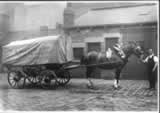 |
Moorhouses were the first company to
produce mincemeat on a commercial basis and on the day of the first delivery,
11th April 1891, the electric tram ran for the first time in Leeds and
it frightened the horse drawing the delivery cart so that it bolted and
the first delivery was lost.
By 1893 the business was supporting William,
Angiolina and three of the older sons. Mr Laxton, a business
associate of Williams recalled visiting the house in about 1895 and
seeing Angiolina cutting out by hand, from greaseproof paper, the discs,
which in those days were placed on the surface of the jars of Lemon
Cheese to prevent evaporation and crystallization after packing. There
were also two of three hired hands to help production. |
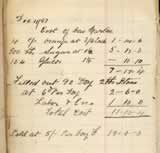 |
At the First Grocers' Exhibition held in Leeds, William had a stand displaying
his products and he won a Diploma of Merit for the high quality of his
Lemon Cheese. Additional premises were taken in Camp Road in 1897 because
of the demand for Moorhouse's products but after only two years there,
the company needed even bigger premises and so they took a larger premises
at Proctors Place off Meanwood Road. The company products, particularly
Lemon cheese, had obtained a household reputation in many towns of the
West Riding for its quality.
Look at the costings on the left, of course the "Dec 97" means 1897.
|
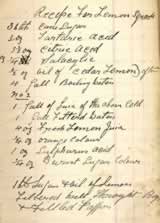 |
William together with his sons Joseph, Thomas Leo
and Baldisaro, continued to expand the range of company products with
various flavours of jam and jellies. They also made plum
puddings and bottled fruits. The products were known as "England's
finest"
because of the high quality of the ingredients used.
Some products never
reached the commercial stage but were enjoyed by the family during
the testing stages including orange, damson and ginger wines, lemon squash,
lemon barley and various candies including barley sugar, jelly squares
and fondant.
|
| |
On the cash account for 1890 William and Angiolina are both drawing cheques
from the company and by the time Angiolina died 1905 the company had assets
of about one thousand four hundred pounds. |
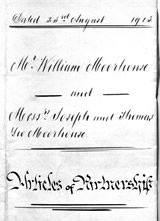 |
In 1913 William signed a partnership agreement with his
sons Thomas Leo and Joseph, which created the company William Moorhouse & Sons
(Baldisaro was not part of the partnership but did work at the Company
as a bookkeeper).
The bell that
William had used in his grocery shop was mounted and used to control
company meetings.
In 1914 Williams son Joseph was called up for military service and
served in the Royal Army Medical Corps for most of the First World
War. Leo was left with his father William and brother Disaro to
run the company.
William Moorhouse & Sons became a Limited Company in
1919 and their Minute Book was meticulously kept. |
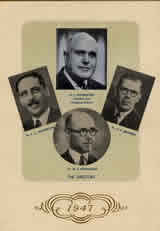 |
In a speech at the 60th anniversary of William Moorhouse & Sons
in 1947 Joseph pays tribute to his brothers Disaro and Leo:-
" both of
whom played a very large part in the developing of the business
in
its early stages and who, in the war years of 1914 to 1918,
were left
to carry on the responsibilities alone,
my father having died in 1917
and
I being away throughout the war"
Sorry, I'm getting ahead of myself again, but I thought
this was a great tribute to his brothers. |
| |
William Moorhouse died on the 17th April 1917 leaving
a business that his two sons, Joseph and Thomas Leo would continue to
run with the help of Baldisaro. Edward was in the Royal Medical
corps in 1917 and would start his own business of Moorhouse
Opticians in 1919, Francis was in The Kings Own Light Infantry and would start
a tailoring business after the war and William's eldest son Charles (who
was a jeweller) had predeceased him earlier the year. |
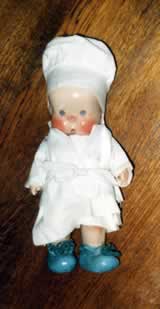 |
The business continued to expand but in 1921 Thomas
Leo died leaving
Joe as the Managing Director to run William Moorhouse & Sons with
his brother Disaro and
in 1925 they purchase a twelve acre site in Old Lane Beeston, on which
had been an electrical firm and included a football field at a total
cost of £13,000.
On the day Joe saw the site it was sunny so he decided that 'Sunglow
Factory' would be a suitable name. A doll dressed as a baker in
a local shop caught Joe's attention as he thought it would be a good
symbol of cleanliness for the company so he purchased the doll and it
became "Sonny Sunglow" the mascot of the company.
Many experiments were done to match and improve on competitors
products as well as new recipes for existing products.
|
 |
William Moorhouse and Sons always made sure that the ingredients used
were the best possible and it is reassuring that the dyes they were supplied
with were arsenic and lead free.
They would test recipes many times to
get the correct mixture to minimize evaporation during the processing.
Sometimes they would experiment with recipes to try and get
a product similar to their competitors and in 1925 they tried at least
11 times to obtain the same result as a Hartley's marmalade.
|
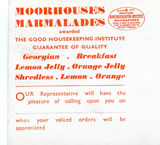 |
Sometimes the company would get requests for products
as when the registrar of a London Hospital wrote explaining that many
of his patients were unable to eat anything that might irritate, but
they did miss their marmalade and could you (Moorhouses) make a marmalade
that is without a suspicion of a shred of peel in it. Some days
later a jar of transparent golden jelly was delivered to the hospital
and soon Moorhouses were asked to supply large quantities of the new
marmalade because the doctors ad nursing staff liked it so much. Moorhouses
also started to produce lemon shredless marmalade. |
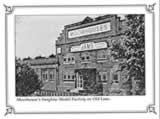 |
In 1930 Baldisaro died leaving Joe as the only son of William in the
company but he was soon joined by his brother Francis on the sales side.
The left shows the Sunglow Factory.
In the 1930's the company was producing its products on an industrial
scales and supplying them not only to the general public but also to
bakers and other factories. The type of product that was made was governed
by the seasons, and it was possible to tell what was being made at the
factory by the smell pervading the local street.
|
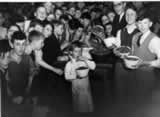 |
In January oranges and lemons would arrives from Spain
and several different sorts of marmalade were produced including Georgian
and shredless. In springtime the Lemon Curd and Lemon Cheese would
be produced because the butter and eggs were richer because the grass
was lusher. The strawberry season was next with the strawberries
coming from farms in Cambridgeshire.
Because there was usually so much seasonal fruit the
work force was augmented by women's organisations and school children. The
picture on the left shows the children from the local Catholic School,
St. Michaels, supplying extra labour, with the foreground figure being
Anthony Moorhouse, elder son of F. G. Moorhouse.
. |
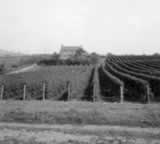 |
After the strawberries came the black
currants from Norfolk, raspberries from farms owned by the company at
Blairgowrie Perthshire [picture on the left] and damsons from Cheshire
all to be made into jams along with blackberries from Ireland. Many
of the fruits were also bottled. In the autumn mincemeat and Christmas
puddings were made with the ingredients coming from Greece, Israel and
the Far East. "Peter puddings" (a type of small sponge
flavoured with ginger, raisins etc) were also produced at this time |
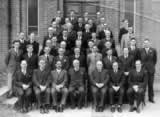 |
Francis Gerard Moorhouse (only son of Charles) joined the company
during the 1920's along with Gerald, eldest son of Edward in the 1930s.
With the arrival of the Second World War the business faced some difficulties
with rationing and shortage of manpower. The company had to ration
the products to their customers based on their orders before the war
and this task fell to Maureen Moorhouse (daughter of Francis) who worked
as Joe's secretary during this time.
Another branch of Moorhouses was
opened during the war in Nuneaton. Because of petrol
shortages the government introduced zoning schemes, and Moorhouses
did not want to lose their Midland customers. The rationing
continued after the war for a number of years. The company
found it difficult to source the butter and eggs for its Lemon Cheese
and made a product called Lemon Conserve during the war which did
not use as many eggs or butter.
Mr Callagher
was the "Fire Watcher" and would check up
on the factory after the "all clear" was sounded, to make sure
there were no fires and if there was any damaged.
Gerald was called up
for Military service and was injured in a "friendly fire" incident
and had to have a leg amputated. He rejoined the company
after a prolonged convalescence in South Africa.
Two more
sons of Edward's joined the company during the 1940's, Leo
[my Father] on the sales side and Bernard in the accounting department.
Gerald moved to Nuneaton to run the other factory there. Bill
(only son of Francis) also joined the company at this time on
the production side. I'll possibly be covering this
generation at a later time on the website. |
 |
According to Antoinette Gallagher (whose father worked for the Moorhouses
for many years on the production side and was the "Fire Watcher" mentioned
above) in an article entitled "Moorhouse's Day" for
a Beeston booklet:
"Mr
Joe had time for his workers and was on first name terms with many
of them.
Whole families worked for him, grandparents, parents, sons and
daughters. When I was seriously ill as a child he would call at the
house with jars of 'Virol'
to build up my strength. When I passed my 11+ he wrote to me
personally to congratulate me and invite me to his home, Garforth House
for tea and I remember visiting his previous home in Adel several times."
The article on the left is another one that Antoinette Gallagher wrote
about Moorhouses. |
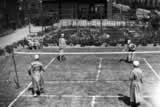 |
On the feast of St Joseph's day the staff and managers
were encouraged to attend the 7a.m. mass at St Anthony's and have breakfast
together in the canteen before commencing work. There was a tennis court
[shown left] and a garden for
the staff to enjoy during their breaks.
Parties were held at the factory
on Bonfire night and Christmas, when the managers acted as waiters.
|
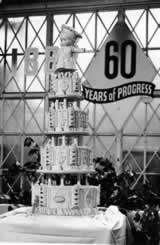 |
Probably the biggest party was in 1947 when the
company celebrated 60 years of William Moorhouse & Sons with a
grand meal in the canteen.
By this time the company was employing over
a thousand people and many of the managers had been with the company
for many years including Mr Baldwin, (Director and Works Manager),
Mr Gallagher (Lemon cheese Production), Mr Hutchinson (Transport
Manager), Mr Stanley Everson (Works Manager) and Mr Wrigglesworth (Sales
Office Manager).
Moorhouses owned several houses across the road from the
factory where members of staff such as
Mr Callagher lived with his family.
|
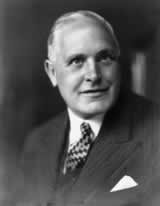 |
Joe was taken ill
after visiting the factory and died of a stroke on 26th March 1950 at
the General Infirmary in Leeds. A
large funeral was held at St
Anne's Cathedral in Leeds and as the hearse
passed the factory employees came out and paid their respects to a
man who had always treated his work force well.
[See Biographies/Joseph
Moorhouse 1881 for more details].
|
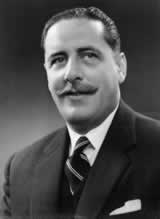 |
Frances Gerard (F.G.) became Managing Director and William
Edward took
over the position of Chairman from his brother.
The business continued
to expand with the building of a factory at Aylesbury (the Nuneaton
factory having been closed the previous year) run by Gerald with the
assistance of Bill. |
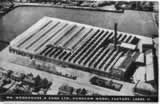 |
The factory at Leeds was also extended by a
third to provide light and airy storage conditions. The factory
had been enlarged on no fewer than 8 occasions over the years.
|
 |
The company was now selling to 19 different countries and within the
UK was making products for Cross and Blackwell, Harrods and Fortnums under
their own labels as well as supplying leading supermarkets under their
labels. |
 |
The company were now using state of the art modern technology and
the fruit could be rushed to the factory and jam produced in a matter
of hours. Laboratory tests were made on every batch and if it did
not conform to the high standard required; production would be stopped
until the problem had been fixed.
The process of production was very mechanical with sugar
being untouched by hand from leaving the refineries to inside the jam
jar. Electronic sensors would also assist in quality control on the finished
products. |
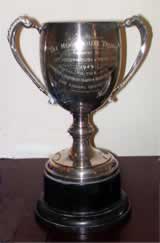 |
Moorhouses had a close relationship
with the Bakery trade (which it supplied directly with jam and bottled
fruit) and it sponsored annual competitions for the Master Bakers' Association.
Most of the salesman attended courses on food technology and baking
so that they would be informed about the processes involved.
|
 |
The next generation of the Moorhouse
family was joining the company. Peter [younger son of F.G.] started
in production* and Anthony [elder
son of F.G.] was due to join the sales side full time having completed
a two year food technology course, but Anthony was
called up for military service and was killed at Port Said in Egypt during
the Suez Crisis.
*See Memoirs of a
Jam Boiler by Peter Moorhouse
The Minute Book shown on the left contains the meticulous
minutes from
meetings of William Moorhouse and Sons Ltd from 1919 (shortly after it
was formed into a limited company) until 1957, two years before it was
sold to Schweppes.
|
 |
In 1959 William Moorhouse & Sons was bought
by Schweppes along with Chivers and Hartleys (who were also jam and marmalade
manufacturer's). |
 |
In 1969 Schweppes merged with Cadburys and by 1972
they had decided they no longer required a factory at Beeston. The closure
resulted in the loss of 590 jobs. Many of the people losing their jobs
had worked for Moorhouses for many years. |
| |
The factory continued to be used by Cadbury Schweppes as a warehouse
until July 1976 when a spectacular fire destroyed most of the building. |
 |
In 1987 the descendants of William Moorhouse
gathered together in Wetherby to celebrate the founding of the business
of William Moorhouse & Sons 100 years previously.
There was a Centenary Dinner and Dance followed by a
Mass of Thanksgiving the following day at the house of David Moorhouse
(grandson of William Moorhouse). |
< Businesses |
|

